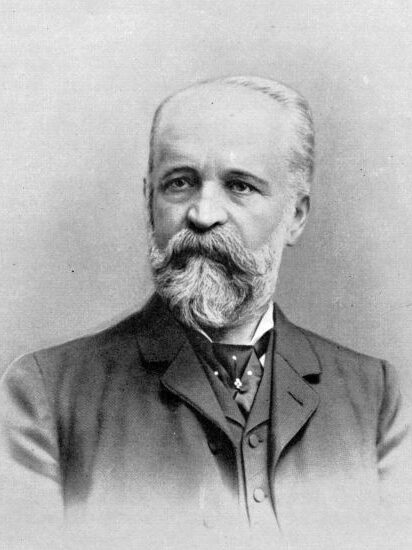Kalle, Wilhelm
Chemist, entrepreneur
Paul Wilhelm Kalle
Born: April 26, 1838 in Paris
Died: February 24, 1919 in Biebrich am Rhein
The Kalle family came from the area between Meschede and Iserlohn in Westphalia. One branch of the family moved to Wesel on the Rhine. Jakob Alexander Kalle (1796 - 1865), the father of Wilhelm Kalle, came from this branch. Jakob Alexander Kalle worked as a merchant in the Krefeld silk industry. He moved to Paris, where he ran an import and export business with silk and woolen goods. Wilhelm Kalle was also born in Paris. The family had a total of nine children, including the entrepreneur and social politician Jakob Friedrich (Fritz) Kalle.
In 1848, his father gave up his business, moved to Germany and settled with his family in Wiesbaden, because his wife's family, who was born Thurneyssen, came from Frankfurt am Main and owned an estate in Walluf.
After the family moved, Wilhelm Kalle and his older brother Fritz, who had previously been brought up in Keilhau in Thuringia, a Fröbel foundation, came to Wiesbaden. Here they attended the Regal Gymnasium. Wilhelm Kalle passed his school-leaving examination at the grammar school in Siegen in 1857. He was already attracted to the natural sciences during his school years, so that he began studying chemistry after graduating from high school. In preparation, he attended the Fresenius Chemical Laboratory in Wiesbaden. From the winter semester of 1857, he studied at the universities of Berlin and Marburg from 1858. He completed his studies with a doctorate in 1861. His first job as a chemist was near Paris.
He returned to Wiesbaden at the beginning of 1863. His father suggested that he set up his own business and found a factory for aniline dyes. He provided him with 100,000 guilders for this purpose. On August 8, 1863, the limited partnership "Kalle und Compagnie"(Chemische Fabrik Kalle & Co.) was entered in the commercial register. The factory site on the banks of the Rhine in Biebrich, where he began production, was initially only leased. As early as August 13, he was able to offer the first dyes produced in his own company for sale. Aniline blue Kalle" in particular proved to be a success. The quality of the products manufactured by Kalle was far superior to the French and English products that had previously dominated the range. In the second year of the company's existence, Wilhelm Kalle was able to acquire the initially leased Kurfürstenmühle site. From this point on, the property grew from year to year.
After the death of his father in 1865, he was able to persuade his brother Fritz to join the company and take over the commercial management. However, after Fritz left the company in 1881, Wilhelm Kalle continued to run the company alone. In 1884, he expanded the product range to include the manufacture of medicines, e.g. iodol and antifebrin. These were joined by remedies for leprosy and tuberculosis. Branches were established abroad from 1882.
In 1897, he made his son Wilhelm Jakob Ferdinand Kalle his partner. In 1904, Wilhelm Kalle resigned from the management of the company and was elected Chairman of the Supervisory Board of "Kalle und Co Aktiengesellschaft". Under his leadership for more than 50 years, Kalle & Co gained a worldwide reputation.
Kalle was not only active in the entrepreneurial field, but also in politics. He was a member of the Biebrich am Rhein town council from 1877 to 1912. He was also elected to the district council of the Wiesbaden district. He was also a member of the Prussian state parliament in 1909. He was also involved in the professional field as a member of the Chamber of Industry and Commerce in Wiesbaden, of which he was a member of the executive committee for many years.
In addition to his political activities, he was also socially committed. Together with his brother Fritz, he took care of both the security of his workers and their further education. Among other things, this led to the founding of the Biebricher Volksbildungsverein, which set up a library and ran a public reading room. The association also organized public lectures on general educational topics. Kalle also had a boys' training school established.
In addition to numerous decorations, he was honored by Kaiser Wilhelm II with the title "Geheimer Kommerzienrat" in 1888. The Technical University of Dresden awarded him the title of Doctor of Engineering in 1913 and the town of Biebrich made him an honorary citizen in 1913. Wilhelm Kalle died at the age of 81 as a result of pneumonia. The "Wilhelm-Kalle-Straße" in the center of Biebrich was named after the entrepreneur.
Literature
The Kalle dynasty. Pioneering spirit and social commitment. In: Schmidt-von Rhein, Georg (ed.): 175 Casino-Gesellschaft 1816-1991, Taunusstein 1991 (pp. 160-166).
